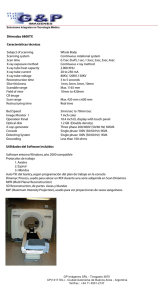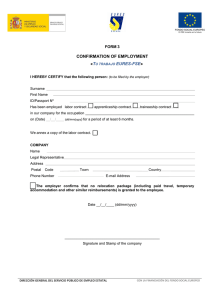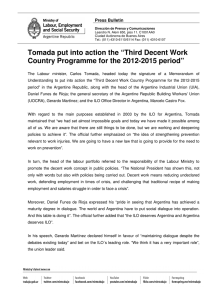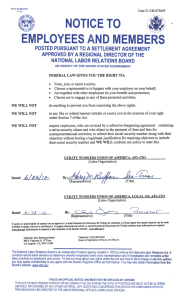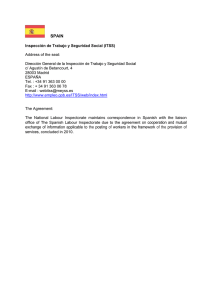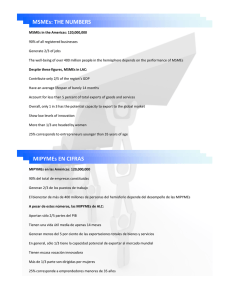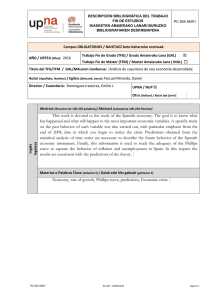Resultado 19 (PDF 158 Kb)
Anuncio
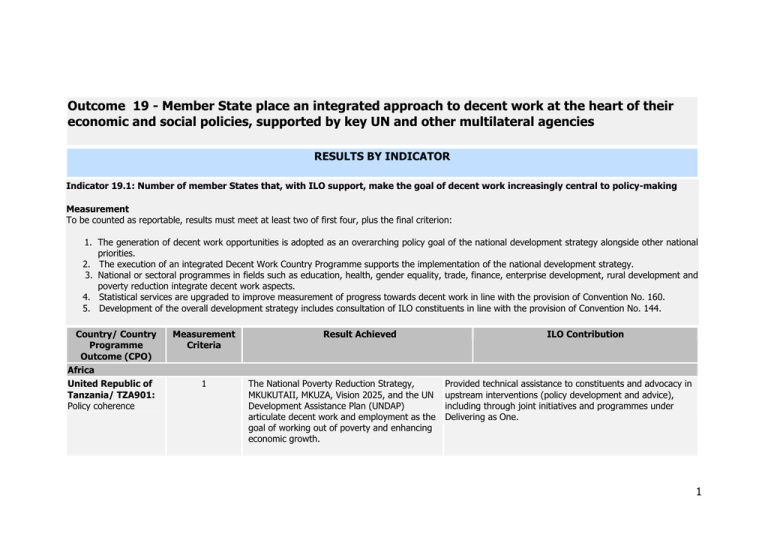
Outcome 19 - Member State place an integrated approach to decent work at the heart of their economic and social policies, supported by key UN and other multilateral agencies RESULTS BY INDICATOR Indicator 19.1: Number of member States that, with ILO support, make the goal of decent work increasingly central to policy-making Measurement To be counted as reportable, results must meet at least two of first four, plus the final criterion: 1. The generation of decent work opportunities is adopted as an overarching policy goal of the national development strategy alongside other national priorities. 2. The execution of an integrated Decent Work Country Programme supports the implementation of the national development strategy. 3. National or sectoral programmes in fields such as education, health, gender equality, trade, finance, enterprise development, rural development and poverty reduction integrate decent work aspects. 4. Statistical services are upgraded to improve measurement of progress towards decent work in line with the provision of Convention No. 160. 5. Development of the overall development strategy includes consultation of ILO constituents in line with the provision of Convention No. 144. Country/ Country Programme Outcome (CPO) Measurement Criteria Result Achieved ILO Contribution Africa United Republic of Tanzania/ TZA901: Policy coherence 1 The National Poverty Reduction Strategy, MKUKUTAII, MKUZA, Vision 2025, and the UN Development Assistance Plan (UNDAP) articulate decent work and employment as the goal of working out of poverty and enhancing economic growth. Provided technical assistance to constituents and advocacy in upstream interventions (policy development and advice), including through joint initiatives and programmes under Delivering as One. 1 A Decent Work Country Profile was finalized and endorsed by tripartite constituents. 2 Implementation of the Decent Work Country Provided technical input and support to constituents in Programme (DWCP), in which selected national articulating priorities and in the process of developing the priorities (youth employment, child DWCP. development, social protection, skills development, governance) are incorporated. The budget of the Ministry of Labour (MOL) takes into account the DWCP priorities. 3 Tenets of decent work were incorporated into sectoral programmes implemented under the auspices of UN Joint Programmes (social dialogue, working conditions, equal opportunity - JP2 and JP10). Introduced CEB Toolkit as a major tool for facilitating the integration of the Decent Work Agenda into sectoral policies. Provided technical assistance under the auspices of UN Joint Programmes and UN Fund throughout the joint programme implementation. Assessment of selected policies using the CEB Toolkit for Mainstreaming Employment and Decent Work completed. 5 ILO constituents engaged in process of articulating, developing and executing development strategies: Poverty Reduction Strategy, MKUKUTAII, MKUZAII. Provided technical assistance for participation of constituents in sectoral and national fora on articulating and drafting development strategies, both through ILO-specific interventions and through UN Joint Programmes (led by ILO). Inclusion of constituents in governance structure of development frameworks (UNDAP, UNJPs). South Africa/ZAF102: Decent work at the centre of economic policies 1 The Government launched the New Growth Path Framework (2010), a policy framework which aims to maximize the creation of decent work opportunities. One of the strategic objectives of the MediumTerm Strategic Framework (2009-2014) that guides the Government's Programme of Action Provided capacity-building support to enhance constituents' understanding and knowledge of the Decent Work Agenda. This has facilitated vibrant national policy dialogue around decent work. 2 is to promote more inclusive growth, decent work and sustainable livelihoods. Outcome 4 of the Strategic Framework specifically seeks to promote decent employment through inclusive growth. 2 The South Africa Decent Work Country Programme, launched in 2010, responds to the national development strategy outlined in Government's Medium Term Strategic Framework (2009-2014). A strategic priority area outlined in the Medium-Term Strategic Framework is acceleration of growth and transformation of the economy to create decent work and sustainable livelihoods. Provided technical support and guidance in the drafting of the Decent Work Country Programme - The process took into account national priorities and national policy responses to key decent work deficits in the country. The DWCP is the culmination of a close partnership between the ILO and NEDLAC (National Social Dialogue Institution) in identifying key decent work deficits in South Africa and developing focused strategies to address such deficits. Held several consultative workshops with Government and the social partners in formulating the DWCP, which strengthened capacity of constituents on decent work and the Decent Work Agenda. 5 a) The employers' and workers' organizations made technical inputs into the New Growth Path Strategy that was launched by Government in 2010. b) Formulation of the National Response Framework (NRF) on the Global Economic Crisis was a culmination of tripartite consultation. The NRF is currently being implemented by the tripartite partners. a) Held training workshops for members of a labour federation to enhance their understanding of the proposals contained in the New Growth Path Strategy, enhancing their capacity to engage in national dialogue and influence the policy framework; supported study undertaken by Business Unity South Africa (BUSA) aimed at strengthening employers' capacity to take a policy position on inclusive job-rich growth, which resulted in a discussion paper discussed at a policy forum workshop held in October 2010. b) Held workshops with the Turin Centre to strengthen the capacity of constituents to engage effectively in social dialogue, including two capacity-building workshops for trade union affiliates, aimed at strengthening the capacity of trade unions to contribute effectively to the 3 implementation of the NRF. Arab States Syria/SYR901: Mainstreaming decent work 1 The Eleventh Five Year National Development Plan (2011-2015) included employment and decent work as one of its key pillars. Likewise, the draft UNDAF (2012-2016), which was prepared by the UN jointly with the Government, also included specific mention of employment creation and decent work under one of its outcomes. 2 The Tenth and draft Eleventh Five Year Plans both included specific reference to the creation of employment and decent work, with a focus on social protection. 5 A decent work tripartite committee was actively engaged in the implementation and monitoring of the DWCP and they also participated in the discussions leading to the preparation of the Second Country Analysis and UNDAF (20122016). 1 The National Mid-term Development Plan (RPJMN) has mainstreamed decent work. The Indonesian Jobs Pact (IJP) provides an overarching policy framework to promote decent work. Provided technical assistance for the drafting of the employment chapter of the Eleventh Five Year Plan and contributed a paper on mainstreaming employment and decent work in the UN Country Analysis. Many components of the latter were used in drafting the relevant sections of the CA/UNDAF (2012-2016). With ILO assistance, the first DWCP for Syria was prepared in line with the Tenth National Five Year Plan (FYP) (20062010). Through advocating for social protection, promoting social dialogue and international labour standards and contributing to job creation and SMEs development, the DWCP, which was implemented with ILO support, contributed to the realization of the objectives of the National FYP related to providing a more active role for the private sector and other development partners in the planning process; job creation with a focus on SMEs. In order to ensure a substantive role for this committee that was tasked with monitoring the implementation of the DWCP, provided technical assistance for developing the capacities of its members in a number of areas, including results-based management, monitoring and evaluation, and UN Reform (CEB Toolkit and CA/UNDAF process). Asia-Pacific Indonesia/IND904: Indonesian Jobs Pact Implemented activities to raise awareness about decent work among policy-makers; published the Global Jobs Pact Scan for Indonesia, which provided technical support to the IJP process and helped the IJP mainstream decent work. 4 Pakistan/PAK126 : The Decent Work Agenda mainstreamed into the One UN Reform Pilot Programme 2 DWCP in Indonesia reflects the priorities of the national development strategy. Provided technical assistance to support the DWCP, effective support to national development and support for the realization of the RPJMN in various areas, such as reducing child labour, promoting gender equity and improving vocational education and training. 3 As RPJMN mainstreamed the Decent Work Agenda, many national and sectoral programmes reflect decent work aspects. For example, entrepreneur education is incorporated in the vocational high school curriculum. The Government has adopted sexual harassment guidelines. It also established a policy working group on trade and employment. Provided technical assistance to constituents to integrate decent work aspects in national or sectoral programmes. 4 Indonesian constituents have developed Decent Work Indicators and a Decent Work Country Profile for Indonesia. Provided technical assistance to constituents for the formulation of the Decent Work Country Profile and decent work indicators, including through capacity building. 5 Development of the RPJMN and the IJP both involved Implemented capacity-building activities to enable consultation with constituents. constituents to actively take part in policy debate and identify the priorities of the Indonesia Jobs Pact. 1 The value of workplace conditions in productive human and social capital development for sustainable employment was incorporated as an important priority in the new Pakistan Growth Framework adopted in May 2010. 2 The new Pakistan Growth Framework (May 2011) With resources provided by the One Pakistan Fund, recognizes the role of workplace organization and the conducted a series of capacity-building and awareness Provided technical inputs to the various UN system-wide needs assessments over the course of 2010 and 2011 (PCNA, DNA, DLA, FIMA, One Programme I) that highlight the importance of the quality, as well as the quantity of employment as being a prerequisite for sustainable livelihoods and peace building. Conducted awareness ILO's TREE (Training for Rural Economic raising and capacity building on decent work using the Empowerment) methodology recognized by the CEB Toolkit on Employment and Decent Work, as a World Bank in Pakistan as a sustainable response to prerequisite for sustainable livelihoods and peace the post-crises needs in KP and FATA. building. Replicated the TREE methodology in the postcrises implementation programme for KP and FATA. 5 regulatory environment in the productivity of Pakistani workers and the economy. The DWCP I (2005 - 2009) formed the basis of the DWCP II (2010 - 2015) and articulated four decent work priorities: labour law reform, employment generation, expansion of social protection and social dialogue. DWCP outputs have been incorporated in the One Programme I (2004 - 2012) (Pakistan UNDAF). 3 a) National Disaster Management Authority (NDMA) formally gave notification of a policy on nondiscrimination on the basis of sex and gender roles in any disaster response interventions, particularly those relating to livelihoods recovery. programmes on the use of the CEB Toolkit for Employment and Decent Work, and advocated with the National Planning Commission to acknowledge that quantity and quality are important factors for increased productivity and competitiveness. Conducted advocacy programmes (workshops and expert group meetings), in partnership with the National Commission on Status of Women (NCSW), the Ministry of Women’s Development (MoWD) and NDMA on nondiscrimination in disaster response interventions. Fifty road safety training institutes managed by the National Highway and Motorway Police have agreed to incorporate the training programme to facilitate women’s mobility through public transport into their regular syllabus before the end of 2011. Under the One Pakistan Funded Towards Gender Parity (TGP) project, conducted 12 baseline/assessment studies to assess gender disparities in employment-related policies and programmes, including women’s mobility through public transport, residential facilities and day care facilities for working women, the national SME Policy, National Skills Strategy, selected national youth Workers’ Welfare Board in Sindh has agreed to employment programmes (such as the National provide subsidies to employers who provide residential and day care facilities for women working Internship Programme), labour forces survey methods and social protection programmes (especially in the outside their home towns. informal economy), and on the situation of home-based workers. 4 The federal Labour Market Information and Analysis Provided technical assistance to support the analysis of (LMIA) Unit produced district-level employment district-level data and the production of district-level trends reports for the first time (Faisalabad District of employment trends reports. Punjab). A set of five reports focusing on general employment trends, youth, women and skills now provide more focused information to policy-makers 6 and other labour-market stakeholders. Philippines /PHL102: National employment policy and decent work strategy integrated into the new Medium-Term Philippine Development Plan and UNDAF 5 Decent work and the importance of workplace issues is being increasingly acknowledged and used by both UN and non-UN partners. The tripartite grouping of government, employers and workers is no longer questioned in the development and implementation of One UN programmes. Decent work is increasingly being quoted by other UN agencies in written and verbal communications. 1 a) The Philippine Development Plan (PDP) for 2011- a) Delivered a paper on employment, which was 2016 underscores that the policy challenge is to presented during tripartite consultations conducted to increase decent and productive employment and gather inputs to the Philippine Development Plan; to enhance inclusive job-rich growth. delivered training on employment targeting for the b) The Philippine Labour and Employment Plan Department of Labour and Employment and relevant (LEP) for 2011-2016, a sectoral plan of the PDP, national agencies, which enabled them to develop provides the strategic directions for labour and employment targets included in the Philippine employment in the medium term, following the Development Plan. decent work framework. b) Provided technical assistance for the formulation of c) A National Strategy on Youth was adopted and the Labour and Employment Plan for 2011-2016, presented to the President during the including a country paper which was used as input to International Youth Day on 12 August 2011. the plan and inputs to consultations conducted for the d) Under the new UN Development Assistance plan. Framework (UNDAF), 2012-2018, Outcome 2 (of c) Provided technical assistance for the preparation of four outcomes) is on decent and productive the strategy paper, through the MDG Achievement employment for sustained and greener growth. Fund Joint Programme on Youth, Employment and Migration. d) Provided technical assistance for the UNDAF formulation process and leading consultations on the formulation of inputs to Outcome 2 of the new UNDAF. a) Know About Business (KAB) modules were adopted as instructional materials on entrepreneurship in public high schools. Private Provided technical assistance to constituents to engage in the implementation of the One UN reform pilot programme since 2007. Ministry of Labour, with the ILO co-chair the Task Force on Decent and Productive Employment of the Agriculture, Rural Development and Poverty Reduction. a) Provided technical assistance to the Bureau of Secondary Education in the roll-out of the programme through the Youth Employment Project. Provided 7 high schools are encouraged to use the modules. technical assistance to the Bureau of Local b) The National Commission on Indigenous Peoples Employment on the development of training and (NCIP) adopted a master plan for indigenous assessment guidelines and in the capacity building of peoples’ empowerment and the development of Public Employment Service Offices in four project ancestral domains. provinces. c) Participatory gender audit results used as b) Provided technical assistance to the NCIP through the baseline and to mainstream gender in process leading to the adoption of the plan. programmes and projects of national agencies: c) Conducted training of facilitators on Participatory Departments of Labour and Employment, Social Gender Audits, provided assistance for the Welfare and Development, Interior and Local implementation of participatory gender audits, and Government, and Philippine Commission on shared publications and materials on gender equality. Women. d) Provided technical inputs to consultations on the d) The National Climate Change Action Plan National Climate Change Action Plan and the forum incorporates green jobs. on greening of the Labour and Employment Plan. 4 a) The National Statistical Office and Bureau of a) Delivered training on the Philippines Employment Labour and Employment Statistics are now able Projections model, including simulations for to conduct data tabulations and analysis on remittances and consumption, green jobs and labour market and decent work indicators, vulnerable employment; provided technical assistance simulate employment projections and gather for the compilation and tabulation of Statistical provincial-level estimates on the labour force. Decent Work indicators (1995-2010), review of the Labour Force Survey to ensure capture of decent work elements, completion of sampling and survey b) The National Statistics Office included, for the design for provincial estimates of the Labour Force first time, ethnicity variables in the 2010 census. Survey, and preparation of the Decent Work The ongoing data processing will produce Philippines Country Profile. statistics on indigenous peoples. b) Delivered a national training of NCIP focal persons and enumerators of the National Statistical Office enumerators on understanding and applying the ethnicity variable; conducted regional and provincial orientation of enumerators of the National statistical office where NCIP focal persons became resource speakers to explain the application of the ethnicity variable. 8 Viet Nam/ VNM128: Improved policies, strategies and data for employment creation and labour market management 5 The Trade Union Congress of the Philippines, Provided technical assistance for tripartite-plus Federation of Free Workers and Alliance of consultations conducted at the national and sub-national Progressive Labour and other trade unions, together levels. with the Employers’ Confederation of the Philippines, participated in the national and sub-national multisectoral consultations conducted by the Department of Labour and Employment to generate inputs to the formulation of the new Philippine Development Plan (2011-2016) and the Labour and Employment Plan (2011-2016). 2 DWCP 2012-2016 for Viet Nam developed and addresses the country’s priorities as set out in the Socio-economic Development Strategy and the Socioeconomic development Plan. It is fully in line with the UN One Plan 2012-2016 for Viet Nam. Provided technical assistance, and held consultations with the social partners and the UN team in Viet Nam throughout the process of developing the DWCP and One Plan. 3 Decent work aspects integrated into such important national or sectoral programmes as the National Social Protection Strategy 2011-2020 and the National Employment Strategy 2011-2020. Conducted assessment of mainstreaming of employment and decent work in the National Social Protection Strategy 2011-2020; provided technical assistance to the government in developing the National Employment Strategy 2011-2020. 5 Development of the DWCP and One Plan 2012-2016 Conducted capacity-building activities to improve capacity involved participation and consultation with of ILO constituents in policy debates and in identifying constituents. priorities for national and sectoral strategic planning; undertook close consultations with constituents in the development of the DWCP and One Plan 2012-2016, as well as in the preparation of UN/ILO input for the country’s SEDS and SEDP. Americas Argentina/ARG 101: Capacidades del MTESS y de los actores 1 El gobierno ha adoptado el TD como meta de su estrategia de desarrollo nacional y como bandera en diferentes foros internacionales. Prueba de ello son: En el marco del Pacto Mundial para el Empleo, la OIT brindó asistencia técnica para el desarrollo de estudios analíticos, tal como: examen de la situación nacional 9 sociales fortalecidas, de acuerdo con sus incumbencias específicas, para coordinar adecuadamente las políticas laborales con las económicas y sociales, con base en el Pacto Mundial para el Empleo la solicitud conjunta de Argentina y Brasil (a iniciativa de Argentina) de incorporar a la OIT en las discusiones del G-20 en relación a la crisis mundial; las acciones desarrolladas para morigerar el impacto de la crisis mundial en el marco del Pacto Mundial para el Empleo (Argentina es país piloto); la incorporación del concepto de Trabajo Decente en la currícula de la enseñanza media a nivel nacional, etc. (country scan), documentos de análisis del mercado de trabajo, informe sobre la situación de Argentina en el contexto internacional: macroeconomía, mercado laboral, protección social y distribución del ingreso (serie Crecimiento con equidad, IIEL), y documento Impactos de la crisis sobre las relaciones industriales y la negociación colectiva en Argentina. La OIT también apoyó varias reuniones, tal como la reunión Tripartita Políticas Frente a la Crisis: El PME en Argentina y la Reunión preparatoria G-20 en Buenos Aires, 2011 (publicación) El II PTDP 2008-2011, acordado y aprobado tripartitamente, refleja las prioridades tanto del Gobierno como de los actores sociales. Asimismo, es plenamente coherente con el MANUD Argentina 2010-2014, donde el Trabajo Decente tiene un lugar destacado, en línea con la incorporación a los ODM del objetivo adicional "Promover el Trabajo Decente". A partir de las prioridades identificadas en el PTDP, se acordaron las acciones principales en el marco del PME, del cual Argentina es país piloto. En relación con el Trabajo Decente, el proceso de Serie OIT Notas Trabajo Decente en Argentina: A partir de los ejes prioritarios del PTDP 2008-2011, diagnósticos recientes sobre la situación nacional y otros documentos sobre temas específicos, las Notas OIT brindan un análisis estratégico de las dimensiones que se proponen como ejes prioritarios de acción para el PTDP 2012-2015, en coherencia con las prioridades de OIT, a fin de promover el empleo pleno y productivo y el TD como elementos centrales de las políticas económicas y sociales, de acuerdo con la Declaración sobre la justicia social para una globalización equitativa y el Pacto Mundial para el Empleo. ARG 102: Sistema de Indicadores de Trabajo Decente consensuado por los mandantes, en aplicación, produciendo información que permita monitorear la situación laboral en Argentina 2 10 evaluación como país piloto del Pacto Mundial de Empleo, apunta a asumir el actual PTDP como un insumo y a partir de allí, fortalecer el PME para luego integrar su contenido en el nuevo PTDP 2012-2015. Se ha entendido por los actores tripartitos que el potencial que surge de entrelazar el PME con el PTDP es garantía para hacer sostenibles las políticas de Trabajo Decente y acompañar una estrategia de desarrollo incluyente y con empleo. 3 El Gobierno argentino puso en marcha la Asignación Universal por Hijo, en línea con la iniciativa ONU de un Piso de Protección Social. El Ministerio de Educación ha incorporado a la currícula de la enseñanza media el concepto de TD y los contenidos de la Declaración de Principios y Derechos Fundamentales en el Trabajo. El Poder Ejecutivo declaró 2011 como el "Año del Trabajo Decente, la Salud y Seguridad de los Trabajadores". Ello implica que toda la papelería y letreros gubernamentales (plazas, obras públicas, etc.) tendrán este lema. El Decreto (75/2011) hace expreso reconocimiento al Programa de Trabajo Decente de la OIT. 4 -Publicación "Aportes para la construcción de un piso de protección social en Argentina: el caso de las asignaciones familiares" sobre el impacto de los programas de transferencias para la niñez en la pobreza y la desigualdad -Estudio sobre el impacto de la Asignación Universal por Hijo (AUH) en el mercado de trabajo y otro -de carácter cualitativo- sobre la AUH en la población indígena en Argentina -Documento OIT-CEPAL Previsión social en Argentina: reformas, cobertura y desafíos -A propuesta de OIT y el desarrollo de materiales referidos a la iniciativa del PPS, el Coordinador Residente asumió el liderazgo de una iniciativa ONU en Argentina sobre el PPS. -Desarrollo de un curso virtual "Construir futuro con Trabajo Decente" en la Plataforma de capacitación multimedial EXPLORA del Ministerio de Educación dirigido a profesores de enseñanza media de todo el país -Divulgación y difusión de los documentos OIT en congresos, seminarios y jornadas académicas El Ministerio de Trabajo ha fortalecido su capacidad Participación de delegaciones tripartitas argentinas en técnica para producir, aplicar y difundir regularmente talleres regionales sobre medición del TD (Lima, 2010) y 11 un Sistema Nacional de Indicadores de Trabajo Decente. Belize/BLZ 152: Belize has adopted an integrated approach to decent work uso y aplicación de estadísticas armonizadas sobre empleo e ingresos en el Mercosur (Asunción, 2010), ambos organizados por o con la OIT. - A partir de la revisión y actualización del Sistema de Indicadores de Trabajo Decente (SITD) elaborado en 2007 con apoyo de la OIT, relanzamiento del SITD visa-vis los avances conceptuales y metodológicos y la disponibilidad de información. - Actualización y publicación de los resultados del SITD (2011, en curso) y definición de una línea de trabajo permanente en el Ministerio de Trabajo para la actualización periódica de este instrumento. 5 El II PTDP Argentina (2008-2011), acordado y aprobado tripartitamente, está en línea y refleja las prioridades tanto del Gobierno como de los actores sociales. En el marco del II PTDP 2008-2011, se creó el Grupo de Seguimiento del PTDP -de composición tripartita- que, con la secretaría técnica de la OIT. 1 The Decent Work Agenda underpins the national Provided technical assistance to constituents and held development goals of Belize, and supports the consultations held with the social partners and UN team. objectives outlined in the Medium-Term Development Strategy (2010-2013). The DWCP for the period 2012-2015 is aimed at positioning Belize to “enjoy a more harmonious industrial relations climate, built on enhanced social dialogue and human resources development, contributing to the achievement of its national development goals.” The outputs and outcomes of the Belize United Nations Development Assistance Framework (UNDAF, 2012-2015) also mainstream decent work. 2 The revised priorities of the DWCP for the period 2012-2015 (as agreed with the tripartite partners in July 2011) will continue to address issues related to (i) the modernization and harmonization of national labour legislation; (ii) strengthening the public Provided technical assistance and held consultations throughout the process. The Ministry of Labour, Local Government and Rural Development, as well as senior representatives from various ministries and government departments and the social partners, participated in the 12 employment service and enhancing linkages with national initiatives for skills development (with a special focus on disadvantaged groups); and (iii) institutional strengthening of the social partners. Brazil/ BRA201: Los national processes for the development of the DWCP. 5 Development of the DWCP and UNDAF, 2012-2015 involved participation and consultation with constituents. 1 La CNETD será realizada en mayo de 2012 y antecedida por más de una centena de conferencias municipales y regionales y 27 conferencias estaduales (entre junio y noviembre de 2011). Los resultados esperados son la actualización del Plan Nacional de Empleo y Trabajo Decente y la definición de directrices de una Política Nacional de Empleo y Trabajo Decente. La Agenda Nacional de Trabajo Decente para la Juventud fue aprobada por consenso tripartito en noviembre de 2010. El Subcomité de Juventud y el Grupo de Consulta Tripartito promueve la integración del contenido del ANTDJ a los procesos de la I CNETD y de la II Conferencia Nacional de la Juventud. Se consolidan las Agendas Estaduales de Trabajo Decente de Bahía y de Mato Grosso, discutidas con amplia participación de los actores tripartitos. En Bahía, fue formulado, a través de un amplio proceso de discusión tripartita, el Programa Estadual de Trabajo Decente, con planes de trabajo definidos en cada uno de los 9 ejes de la Agenda Bahía. 2 El trabajo decente es una de las cuatro prioridades del La OIT participó activamente de la elaboración del MANUD 2012-2015. La Agenda y el Plan Nacional de MANUD, de la ANETD y del PNETD. Empleo y Trabajo Decente son instrumentos tripartitos del país, elaborados e implementados con el apoyo de la OIT y que enmarcan las acciones de la Planes Nacional, Estaduales y Municipales y la Agenda Nacional de Trabajo Decente para la Juventud son elaborados, implementados y monitoreados en consulta con los constituyentes tripartitos, tomándose en cuenta la Agenda Hemisférica La OIT esta integrada, en calidad de asistencia técnica permanente, al Comité Ejecutivo Interministerial y el Grupo Técnico Tripartito (GTT) de la ANTD, al Subcomité y al GTT de la ANTDJ, al recién creado Subcomité de la Igualdad Racial, así como a la Comisión Organizadora Nacional de la I CNETD (que empezó sus trabajos en mayo de 2011) y a varias comisiones organizadoras estaduales. Las municipalidades de Curitiba (PR), Guarulhos (SP), la Región del ABC paulista, los estados de Paraná y Mato Grosso do Sul (MS) y el Distrito Federal (DF) también han solicitado la asistencia técnica de la OIT para la construcción de sus respectivas agendas de trabajo decente. La OIT estuvo presente en 18 estados brasileños apoyando el proceso de organización de las conferencias estaduales: Alagoas, Bahía, Ceará, Distrito Federal, Goiás, Maranhão, Mato Grosso, Mato Grosso do Sul, Minas Gerais, Paraíba, Pará, Paraná, Pernambuco, Piauí, Rio Grande do Sul, São Paulo, Sergipe y Tocantins. 13 OIT en el País. 3 El Comité Ejecutivo Interministerial (CEI) de la La OIT participa y presta asistencia técnica al CEI y a lo Agenda y del Plan Nacional de Trabajo Decente Subcomité de Asesoramiento Técnico (SAT). cuenta con la participación de 18 ministerios, entre ellos los responsables por los temas de: educación, salud, igualdad de género, industria y comercio, finanzas, desarrollo rural, desarrollo social (reducción de la pobreza), etc. 4 El sistema estadístico nacional (Instituto Brasileño de Geografía y Estadística - IBGE - y otras instituciones estadísticas existentes en diversos estados del país) han incorporado progresivamente la importancia de la producción de datos estadísticos relativos a las diversas dimensiones del trabajo decente. El país se ofreció como piloto para la elaboración de perfiles de trabajo decente de acuerdo a las dimensiones e indicadores definidos por la OIT en 2008 y viene participando de diversas actividades conjuntas con la Oficina con el objetivo de perfeccionar sus metodologías e instrumentos en el sentido de responder a la necesidad de generación de nuevos datos relativos a esas diversas dimensiones. Está en proceso el diseño e implementación de una encuesta suplementaria a la encuesta permanente de hogares (PNAD) del IBGE sobre diversas dimensiones del trabajo decente. 5 La ANTD, el PNETD, la ANTDJ, la Agenda y el Plan La OIT participa, en calidad de asistencia técnica, de estaduales de Trabajo Decente de Bahía y de Mato todas esas instancias tripartitas. En el CDES la OIT Grosso, la agenda intermunicipal de Trabajo Decente participa en calidad de observadora. del ABC paulista han sido formuladas y son monitoreadas por instancias tripartitas, en conformidad con el C. 144. Lo mismo ocurre con todas las instancias de organización y coordinación de La OIT elaboró el segundo "Perfil del Trabajo Decente en Brasil", que incluye informaciones desagregadas de los 27 estados de la federación. Atendiendo a una demanda del Foro Nacional de Secretarias del Trabajo, la OIT realizó seis talleres de construcción y análisis de indicadores de Trabajo Decente, abarcando todas las grandes regiones del país. Los talleres fueran direccionados a la capacitación de técnicos de las secretarias estaduales de trabajo y otras instituciones relevantes en cada estado y tenáin como objetivo inmediato capacitarlos y contribuir a la construcción de diagnósticos estaduales, territoriales, subregionales y municipales de Trabajo Decente como parte del proceso de preparación de las conferencias estaduales de Trabajo Decente. Los 6 talleres regionales de construcción de indicadores del trabajo decente contaron con la participación de técnicos de 24 (de un total de 27) estados brasileños. 14 la Conferencia Nacional y las conferencias estaduales de trabajo decente. Las prioridades de la ANTD y el PNETD han sido considerados en la definición de la Agenda Nacional del Desarrollo (por el Consejo de Desarrollo Económico y Social) - CDES - que asesora a la Presidenta de la República y el en Plan Plurianual de Inversiones (PPA) 2011-2015. Grenada/GRD201: The goal of decent work is made central to policy-making 2 A country-specific programme has been developed for Provided technical assistance to the tripartite implementation in Grenada within the framework of constituents in Grenada for the implementation of the the Decent Work Programme (DWP) developed for Decent Work Programme in Grenada. members of the Organisation of Eastern Caribbean States. The four overarching priority areas identified for the DWP are: review and updating of labour market legislation; strengthening of labour market information systems (LMIS); promoting inclusive workplace policies on HIV/AIDS; and increasing dialogue among Government, workers and employers. 3 Representatives of the employers' and workers' organizations in Grenada have a better insight into the application and promotion of decent work as a tool for development in the context of trade and development, and of the trade negotiation process and the labour provisions of the European Union (EU)/Caribbean Forum (CARIFORUM) Economic Partnership Agreement (EPA). In collaboration with the Office of Trade Negotiations of the Caribbean Community (CARICOM), held three workshops on external trade agreements. One of the workshops dealt specifically with the needs of the Organisation of Eastern Caribbean States (OECS), of which Grenada is a member. 5 The Government of Grenada has recognized the need for all stakeholders to work to create a climate where dialogue and consultation replaces confrontation, as evidenced by statements of the Prime Minister of Grenada published in the media in October 2010. In collaboration with the Grenada Employers' Federation, organized a four-day training workshop on conciliation, mediation and negotiation skills (May 2010), in which representatives of the employers' and workers' organizations and Government officials participated. Conducted a similar training workshop for trade unions (October 2009). In addition, facilitated a tripartite-plus workshop on decent work and policy 15 coherence which incorporated a briefing session on the work programme for Grenada, within the framework of the subregional Decent Work Programme in June 2010. URUGUAY/ URY153: 1 En un contexto con las menores tasas de desempleo La OIT brindó asistencia técnica a los mandantes para la desde que se llevan registros, una de las prioridades organización y participación en los Diálogos en materia del Gobierno del Uruguay es progresar hacia otras de empleo y seguridad social dimensiones del Trabajo Decente, tales como la igualdad de oportunidades, salario suficiente, protección social, negociación colectiva y diálogo social. Esto se ve reflejado en la implementación del Diálogo Nacional por el Empleo y el Segundo Diálogo Nacional de Seguridad Social 2 El Gobierno tiene fijadas sus prioridades en material La OIT brindó asistencia técnica a los mandantes en el de Trabajo Decente y la adopción de medidas de desarrollo de una estrategia nacional para el Trabajo política está teniendo lugar, tanto a través de los Decente. Diálogos, como de espacios de Diálogo Social más institucionalizados, como el Banco de Previsión Social, los Consejos de Salarios y el Instituto Nacional de Empleo y Formación Profesional. 4 En el marco del Observatorio de Mercado del Trabajo La OIT brindó asistencia técnica a las secciones del MERCOSUR, la sección nacional tripartita está nacionales tripartitas del Observatorio de Mercado de desarrollando una aplicación de indicadores de Trabajo del MERCOSUR. Trabajo Decente, de forma armonizada con el resto de los países del bloque. 5 Actualmente, las políticas y normativas nacionales relativas al empleo, la formación profesional, la seguridad social, y la negociación colectiva, son objeto de consulta tripartita. Espacios tripartitos generados para la implementación del pacto global sobre el empleo en el marco de la actual crisis La OIT brindó asistencia técnica en cada una de las instancias tripartitas en el que se debaten las políticas y normativas nacionales. 16 Indicator 19.2: Number of key international agencies or multilateral institutions that, through collaboration with the ILO, mainstream decent work in their policies and programmes Measurement To be counted as reportable, results must meet at least one of the following criteria: 1. There is an increase in the extent to which decent work is mainstreamed in the policies and programmes of the international agency or multilateral institution, drawing on reports on the application of the CEB Toolkit for Mainstreaming Employment and Decent Work. 2. New initiatives that coordinate inter-agency policies and programmes related to the Decent Work Agenda are established. International agency or multilateral Measurement institution Criteria Result Achieved ILO Contribution International Monetary Fund 2 Joint ILO/IMF Oslo Conference led to follow-up collaboration, including joint consultations in several countries experiencing balance of payments difficulties due to the economic crisis. The previous and current IMF managing directors have cited the importance of employment and decent work and collaboration with the ILO during high level fora, such as the G20. Co-organized high-level Oslo conference with the IMF and Office of the Prime Minister of Norway; drafted discussion paper with the IMF. Participated in joint consultations in Bulgaria, Dominican Republic, Greece, Romania and Zambia, bringing social dialogue and employment concerns into discussions. United Nations Food and Agriculture Organization 1 Elaboration of the joint web site with the ILO: “Food, Agriculture & Decent Work” (www.fao-ilo.org). Coordinated joint FAO/ILO web site and provided technical inputs for drafting of guidance publication and brochure. Development of Guidance on How to Address Rural Employment and Decent Work Concerns in FAO Country Activities, and the accompanying brochure Quick Reference for Addressing Rural 17 Employment and Decent Work for FAO staff at regional and at country level. European Commission 1 In its October 2011 “Agenda for Change”, which presents the guiding principles for future EU external development policy, the significance of promoting decent work was made explicit. The Agenda for Change is the result of a very wide consultation launched in November 2010, to which the ILO responded by suggesting detailed policy orientations. Under the “inclusive and sustainable growth for human development” nexus, the EU has explicitly recognized that "The promotion of decent work covering job creation, guarantee of rights at work, social protection and social dialogue is vital". EU development policy documents have included references to decent work since 2005 (European consensus on development, decent work communication) but this is the first time that decent work and its strategic objectives are so high and central on the development agenda. The European Commission is an important partner and donor for ILO technical cooperation. At the end of 2011, the EC and ILO had a portfolio of 30 TC projects. United Nations Development Programme 1 UN Country Teams and Resident Contributed, including through the Turin Centre, to Coordinators have increased the design of training, materials and an online understanding of decent work, in order to course, as well as facilitated training activities. include decent work in UNDAFs. 2 a. UNDP Executive Board endorses the a. High-level advocacy and policy coherency Global Jobs Pact as an institutional efforts. objective, integrating it into the b. Contributed to joint programming exercises at organization’s operational activities the country level, notably in the formulation of (January 2010). UNDAFs in Argentina, Brazil, Chile, Pakistan, b. b. Joint programming activities at the Paraguay, Philippines, Syria, United Republic of 18 country level with UNDP increase the presence of decent work outcomes in UNDAFs. Universal Postal Union 1 Tanzania and Uruguay. a. Using the toolkit self-assessment, the a. Facilitated workshops and provided materials. UPU developed an action plan to b. Provided technical inputs for the elaboration of integrate decent work and trained a brochure on HIV/AIDS in the postal sector. their headquarters staff and This product was a product of “Global constituents on the Decent Work Partnership for a global campaign on Agenda. HIV/AIDS for the postal services”, a joint UNAIDS, UNI, UPU and ILO initiative. b. Development of materials on HIV and the postal sector for use in trainings in Global Campaign pilot countries or other countries on request. EXAMPLES OF GLOBAL OUTPUTS Database on Short-term indicators of the labour market Governments, employers’ and workers’ organizations, labour market analysts and the media can now count on a new public labour statistics tool to better monitor, analyse and understand recent events in the labour market to inform adequate economic and social policy responses, especially in times of crisis. The database covers some 100 countries and territories, providing monthly updated labour market and consumer price indicators. It is accessible through an interactive map organized by country and topic and contains sex-disaggregated data wherever possible, as well as seasonally adjusted sectoral data. The statistical country profiles provide a quick and accurate snapshot, while information organized by topic allows for cross-country comparison and global analysis. The resource is available online at: http://laborsta.ilo.org/sti/sti_E.html Global Jobs Pact web site The trilingual Global Jobs Pact web site was launched in February 2010 to share information on the implementation of the Global Jobs Pact in ILO member States. It is an important aspect of an overall communication and advocacy strategy for incorporating decent work principles in responses to the global jobs crisis. As of the end of 2011, 58 stories had been added, covering 21 countries. There were 57,375 visits to the site, of which 68 per cent were directed from search engines. The web site has been complemented by a news alert (eight issues) sent to over 1,100 recipients, including constituents, ILO colleagues, and 19 staff of diplomatic missions, international organizations, NGOs, think tanks, the news media and academia. The web site can be viewed at: http://www.ilo.org/jobspact/lang--en/index.htm The joint ILO/IMF conference, “The Challenges of Growth, Employment and Social Cohesion” Hosted by the Office of the Prime Minister of Norway in Oslo in September 2010, this historic conference brought together leaders from government, labour, business and academia to tackle the sharp increase in unemployment and underemployment since the 2008 global financial crisis. At the conference, the ILO Director-General and the Managing Director of the ILO agreed to deepen cooperation between the two organizations in two specific areas: a minimum social protection floor and promoting policies for employment-focused growth. The follow-up to the conference has also resulted in enhanced policy dialogue, including joint consultations in Bulgaria, the Dominican Republic, Greece, Romania and Zambia, where the ILO was able to bring social dialogue and employment concerns into the post-crisis policy discussions on economic recovery. Further information, including the background report written by the ILO and IMF, is available at: http://www.osloconference2010.org/ 20

